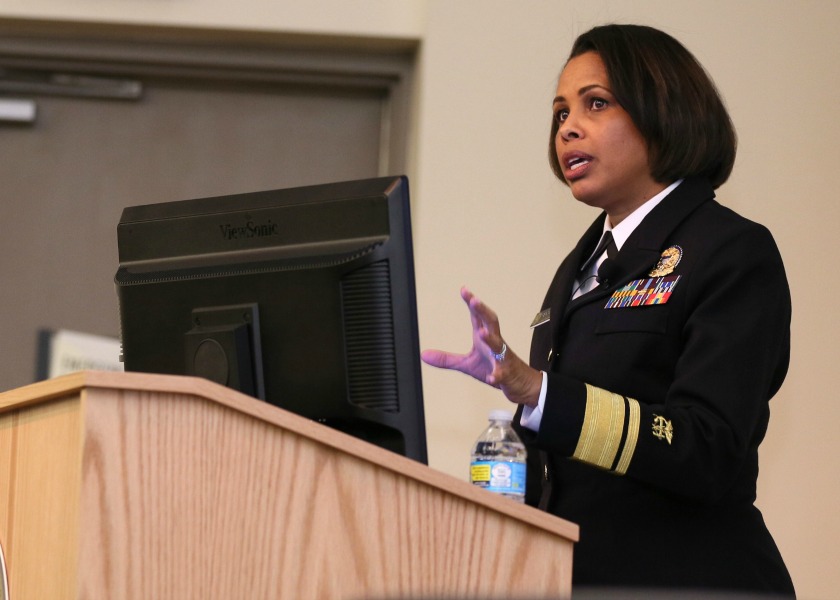Listen to the Rear Admiral’s Talk
Rear Admiral Sylvia Trent-Adams, the U.S. Deputy Surgeon General, visited Vanderbilt University School of Nursing (VUSN) on Monday, January 10, to speak to a packed audience of students, faculty, alumni and campus leaders.
In her presentation, “Health Policy Priorities for Nursing: Past, Present, and Future,” the nation’s top nurse gave an overview of factors that influence the health policy process and health care delivery system in the U.S., and urged nurses to be bold in assuring the nursing profession has a voice in the nation’s health care discussion.
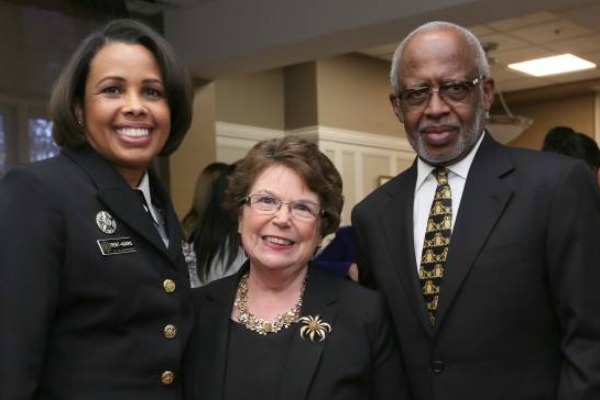 “If you hear nothing else that I say, please know that the take-home message from my entire talk is I believe that nurses are the power force that can change health care delivery in this country,” Trent-Adams, Ph.D., FAAN, said. “I think that the knowledge and experience and the passion that is in this room can have a dramatic impact on the future of health care not only for this country but for the world.”
“If you hear nothing else that I say, please know that the take-home message from my entire talk is I believe that nurses are the power force that can change health care delivery in this country,” Trent-Adams, Ph.D., FAAN, said. “I think that the knowledge and experience and the passion that is in this room can have a dramatic impact on the future of health care not only for this country but for the world.”
Nurses are innately qualified to help shape policy, she said. “Nurses have the strongest stance in health care: being an advocate for patients. Nurses are putting hands on patients more than any other provider in the system. You have your finger on the pulse, both from a policy perspective and a clinical perspective.”
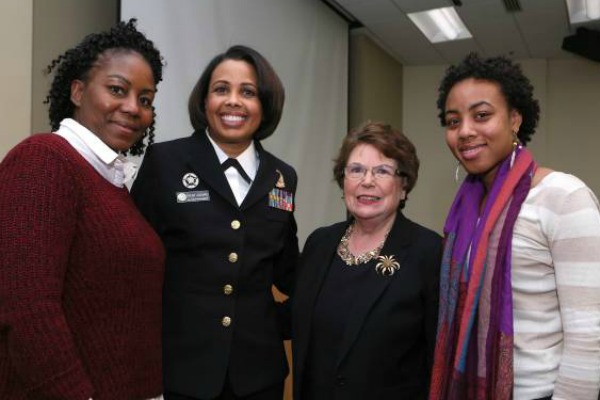 That clinical perspective is needed by policy makers, she said. “Nurses can share their knowledge about how much care actually costs. How many nurses does it actually take to get through the night shift? How many nurses are required to staff a given outpatient facility? How many health care providers, both special and allied health, are required to run a nurse-managed clinic?” she said. Nurses can provide policy makers with the information needed for accurate health planning, including whether decisions made will affect quality.
That clinical perspective is needed by policy makers, she said. “Nurses can share their knowledge about how much care actually costs. How many nurses does it actually take to get through the night shift? How many nurses are required to staff a given outpatient facility? How many health care providers, both special and allied health, are required to run a nurse-managed clinic?” she said. Nurses can provide policy makers with the information needed for accurate health planning, including whether decisions made will affect quality.
Noting that nurses taking the lead in policy decisions isn’t new—she outlined instances in which Florence Nightingale, Harriet Tubman and Clara Barton changed the health policy of their times—Trent-Adams said it was critical that advance practice nurses and nurse leaders today understand the challenges the profession faces.
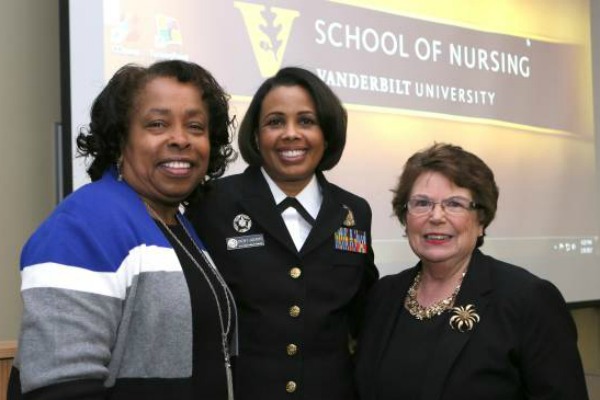 “We have to make sure from a policy perspective that we take control of making (nursing’s) voice heard for the nursing profession. Because we don’t need medicine, pharmacy or dentistry telling us what’s appropriate for nursing in practice, in leadership or in scope of practice,” she said.
“We have to make sure from a policy perspective that we take control of making (nursing’s) voice heard for the nursing profession. Because we don’t need medicine, pharmacy or dentistry telling us what’s appropriate for nursing in practice, in leadership or in scope of practice,” she said.
To have a voice in health policy, Trent-Adams encouraged nurses to sit on corporate boards, share their knowledge with policy leaders at local, state and federal levels, and take up the banner to advocate, educate and be part of the policy discussion.
“Be members of our professional organizations but also be active in the community,” she said. “Make sure that you are engaged in the policy process and making decisions on boards, serving on committees, serving on taskforces and using every opportunity to display that your training and education have trained you well to be at the table and to make those decisions.”
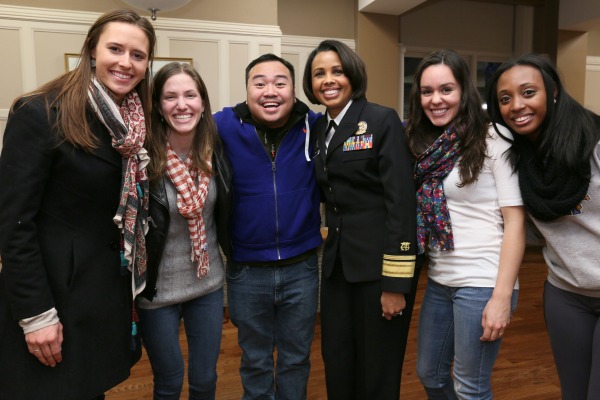 Trent-Adams is second in command at the U.S. Surgeon General’s office. Before being appointed Deputy Surgeon General, Trent-Adams was the chief nurse officer for U.S. Public Health Service (USPHS) Commissioned Corps, a group of more than 6,700 uniformed public health officers working in federal government. In addition to other responsibilities, she helped lead the Commissioned Corps response to the Ebola outbreak in Liberia, which included staffing and managing a 25-bed field hospital for health care workers possibly infected with Ebola.
Trent-Adams is second in command at the U.S. Surgeon General’s office. Before being appointed Deputy Surgeon General, Trent-Adams was the chief nurse officer for U.S. Public Health Service (USPHS) Commissioned Corps, a group of more than 6,700 uniformed public health officers working in federal government. In addition to other responsibilities, she helped lead the Commissioned Corps response to the Ebola outbreak in Liberia, which included staffing and managing a 25-bed field hospital for health care workers possibly infected with Ebola.
The deputy surgeon general’s lecture was the inaugural presentation in the new VUSN Dean’s Diversity Lecture series. The next lecture in the series will be Thursday, May 11, and delivered by Nilda (Nena) P. Peragallo Montano, DrPH, R.N., FAAN, dean of the School of Nursing at University of North Carolina at Chapel Hill.
The VUSN Dean’s Diversity Lecture Series explores the diversity of backgrounds, cultures, ideas and viewpoints in our world today. It seeks to equip students, faculty, staff and other community members with the knowledge and understanding needed to lead nursing forward in a global society.
IMAGES
Top: RADM Sylvia Trent-Adams, U.S. Deputy Surgeon General, presenting on nursing and public
policy.
Inset photos, from top:
Vanderbilt University Vice Chancellor George E. Hill was one of the university leaders to attend the Jan. 9 talk. From left, RADM Sylvia Trent-Adams, Dean Linda Norman and Dr. Hill.
The lecture drew students from all programs. From left, DNP student Marcia Smith, RADM Trent Adams, Dean Linda Norman and PreSpecialty nursing student Shannon Davies.
Professor Mary Lambert, herself a former high-ranking nurse in the U.S. government, was instrumental in facilitating the U.S. Deputy Surgeon General’s visit. From left, Dr. Lambert, RADM Trent-Adams and Dean Linda Norman.
Students enjoyed talking with RADM Trent-Adams at a reception following her presentation. From left: Lizzy O’Brien Ranheim, Susannah Spero, Phat Ho, RADM Trent-Adams, Jaime Bonilla-Young and Denerica Curry.
Photography: Anne Rayner
